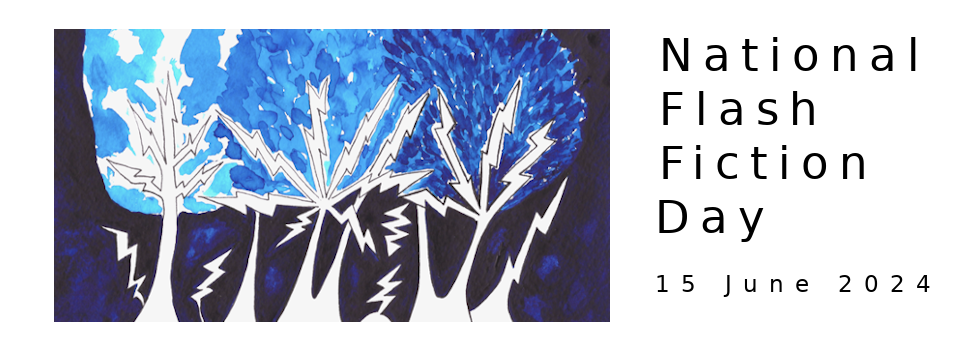National Flash Fiction Day is OPEN for submissions!
It's that time of year again; National Flash Fiction Day is OPEN for submissions to the 2022 NFFD Anthology & Microfiction Competition! We'll be reading submissions from 1 December to 15 February.
Please note that these are two separate projects run by two separate teams with two separate submissions processes. You can read about both below....
NFFD Anthology
The theme of this year's National Flash Fiction Day Anthology is FREEDOM.
What do you think of when you think of freedom? Freedom from, freedom to do, freedom to be?
Does your mind go to prisons and zoos or to protest marches and politics or to leaving the office on a Friday, packing a bag and heading off on holiday? Or is it simply freedom of thought? Or is it George Michael belting out that classic? But maybe you have a very different view of freedom; go on, surprise us!
Feel free to interpret FREEDOM however you wish, in 500 words or fewer. You do not need to include the word 'freedom' in your piece.
This year, we are thrilled to announce that we will be awarding two Editor's Choice Awards. The 2022 editors, Karen Jones and Chris Drew will each select one piece from the accepted stories to receive a £50 prize. Find out more about our editors here and keep an eye on our news feed for their interviews early next year.
You can read our full anthology submission guidelines here or go straight to our submission manager, Duosuma, where you can submit your work.
NFFD Microfiction Competition
We're reading flash of up to 100 words on any theme.
This year, we're offering:
- £150 for first place
- £100 for second place
- £50 for third place
- seven awards of £20 for highly commended pieces.
All winning and highly commended flash will be published both online and in the NFFD print anthology.
Our judges are that Christopher Allen, Joanna Campbell, Tracy Fells, and Damhnait Monaghan. We'll be posting interviews with our judges in the new year, but in the meantime, you can read more about our panel here.
We are not able to consider simultaneous submissions this year, so please don't send us work that will be under consideration elsewhere before we announce the results on or before 15 March 2022. Our full competition guidelines and details of how to submit by email can be found here.
Our Anthology and Microfiction teams look forward to reading your work!

 We are delighted to welcome Sophie van Llewyn to the National Flash Fiction Day team as this year's guest editor for the 2020 National Flash Fiction Day anthology.
We are delighted to welcome Sophie van Llewyn to the National Flash Fiction Day team as this year's guest editor for the 2020 National Flash Fiction Day anthology.
 Angela Readman is the winner of the first National Flash Fiction Day competition. Her short stories have since been winners of The Costa Short Story Award, The Mslexia Story Prize and The Anton Chekhov Award for Short Fiction. Her story collection Don't Try This at Home was short listed in The Edge Hill and won The Rubery Book Award. In January 2019 her debut novel Something like Breathing was published by And Other Stories. She also writes poetry and is published by Nine Arches.
Angela Readman is the winner of the first National Flash Fiction Day competition. Her short stories have since been winners of The Costa Short Story Award, The Mslexia Story Prize and The Anton Chekhov Award for Short Fiction. Her story collection Don't Try This at Home was short listed in The Edge Hill and won The Rubery Book Award. In January 2019 her debut novel Something like Breathing was published by And Other Stories. She also writes poetry and is published by Nine Arches.
 Santino Prinzi is a Co-Director of National Flash Fiction Day in the UK, a Consulting Editor for New Flash Fiction Review, and is one of the founding organisers of the annual Flash Fiction Festival. His flash fiction pamphlet, There’s Something Macrocosmic About All of This (2018), is available from V-Press, and his short flash collection, Dots and other flashes of perception (2016), is available from The Nottingham Review Press. He is also a reviewer of flash fiction collections and novellas-in-flash for various outlets. As well as a nominee for the Best Small Fictions and the Pushcart Prize, his writing has been published in various magazines and anthologies, including Flash: The International Short-Short Story Magazine, Jellyfish Review, And Other Poems, Ink Sweat & Tears, The Airgonaut, Litro Online, Stories for Homes Anthology Vol.2 and many more. To find out more follow him on Twitter (@tinoprinzi) or visit his website:
Santino Prinzi is a Co-Director of National Flash Fiction Day in the UK, a Consulting Editor for New Flash Fiction Review, and is one of the founding organisers of the annual Flash Fiction Festival. His flash fiction pamphlet, There’s Something Macrocosmic About All of This (2018), is available from V-Press, and his short flash collection, Dots and other flashes of perception (2016), is available from The Nottingham Review Press. He is also a reviewer of flash fiction collections and novellas-in-flash for various outlets. As well as a nominee for the Best Small Fictions and the Pushcart Prize, his writing has been published in various magazines and anthologies, including Flash: The International Short-Short Story Magazine, Jellyfish Review, And Other Poems, Ink Sweat & Tears, The Airgonaut, Litro Online, Stories for Homes Anthology Vol.2 and many more. To find out more follow him on Twitter (@tinoprinzi) or visit his website: